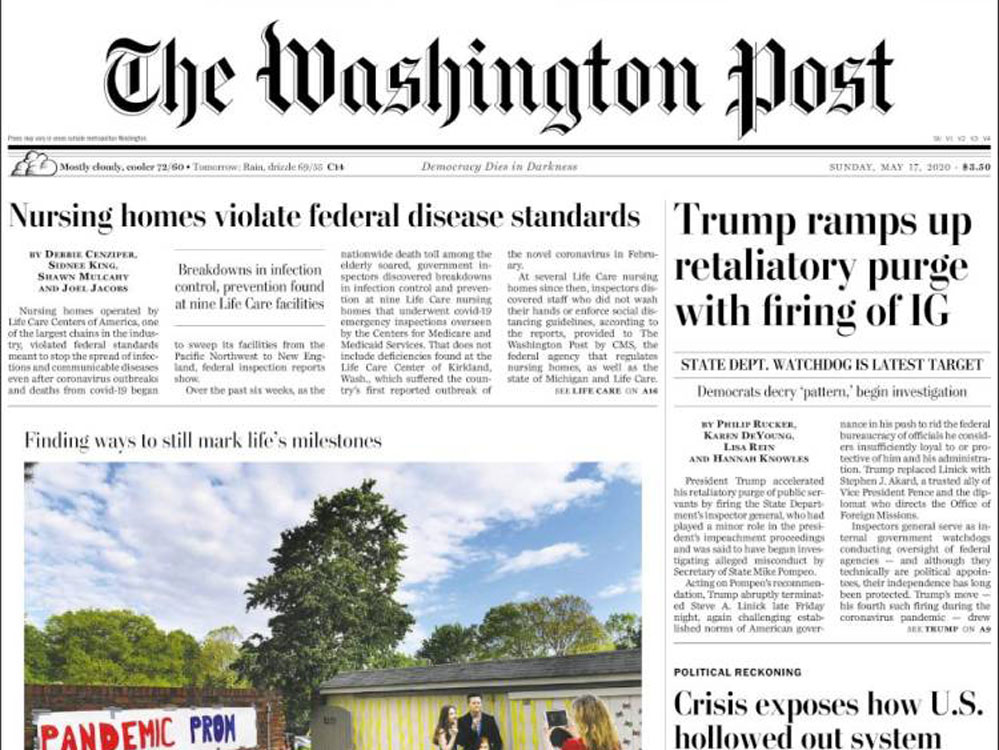In March, the coronavirus was ravaging the Life Care Center of Kirkland, a nursing home in Washington state. Two-thirds of the residents and 50 staff would eventually contract the virus. Dozens would die.
The story of the Life Care Center of Kirkland signaled to a team of students at the Medill Investigative Lab (MIL) at Northwestern University just how vulnerable nursing homes would be to the spread of the virus. With residents and staff unable to socially distance and older individuals having the highest likelihood of developing severe or terminal symptoms, nursing homes would be particularly susceptible.
Having identified this looming crisis, the MIL team sprang into action working with reporters and editors at The Washington Post to develop a data source to track cases of coronavirus at nursing homes across the country. Eventually, that list grew to more than 4,000 facilities and contributed to the coverage in the Post. Medill students worked on more than 15 published stories on the topic.
“The work of student journalists from the Medill School’s investigative program has been crucial in The Post’s ongoing reporting of the pandemic’s tragic impact on nursing home residents,” said Ziva Branstetter, corporate accountability editor at The Washington Post. “These students have provided important data work and have teamed up with Post journalists to tell stories exposing patterns of inequality, waste and lax government oversight at a time when this vulnerable population most needed protection.”
Debbie Cenziper, an associate professor at Medill and the director of the Medill Investigative Lab, also is a Pulitzer-Prize winning journalist who writes for The Washington Post, making the partnership between Medill students and the Post possible. All the stories were completed in the first year of the new lab, which focuses on social justice reporting.
“Like all good journalists, students in the Medill Investigative Lab pivoted quickly in March to write about the devastating impact of COVID-19,” said Cenziper. “Working with a team at The Washington Post and me, they helped tell wrenching stories of illness, loss and love. Lawmakers have called for change. This is what good investigative reporting is all about and I couldn’t be prouder of our talented, passionate and persistent team of journalists.”
“It feels very powerful to be able to do work with this kind of reach and impact,” said Joel Jacobs (MSJ20), a former software engineer who quit his job at Google to pursue investigative journalism and a journalism master’s degree at Medill. “Some of our stories ran on the front page. A few of our articles were republished by my hometown paper, which was definitely a point of personal pride. With all this, there’s also a tremendous feeling of responsibility to make sure we get things right. It can be stressful, but it’s incredibly rewarding.”
With his background in tech, Jacobs dug into federal nursing home data that helped fuel the reporting. “Often, we combined different datasets,” said Jacobs. “Combining nursing home inspection records with our list of homes with outbreaks provided the backbone for our story on the history of infection control issues in nursing homes with coronavirus cases. We also compared outbreak data with demographic data on nursing homes for a story on the disproportionate impact on majority-Black nursing homes.”
Those health disparities resonated with Sidnee King (MSJ20) who set out to tell the story of the coronavirus in a predominantly Black nursing home. She chose a home steps from the birthplace of Martin Luther King, Jr. in Atlanta. Her story combined the history of the Sweet Auburn Historic District with the story of a nurse trying to care for more than 100 residents.
“When Debbie told us that we’d spend the quarter covering coronavirus in nursing homes, it wasn’t long before I got curious about how the virus was impacting Black elderly residents,” said King. “I’d seen how the virus had impacted my own family and community and knew that Black people, in general, were being disparately affected by the pandemic. So as the ongoing national conversation about racial justice grew more prevalent, I really wanted to highlight how even in nursing homes, Black Americans are disadvantaged by systemic racism.”
You can view a full list of student coverage of the pandemic in The Washington Post on the Medill Investigative Lab website.
